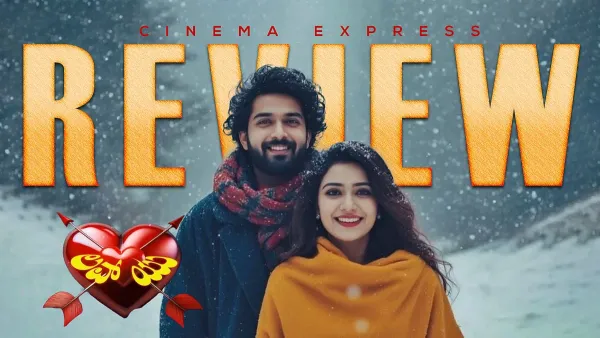
When Nutan, the AI creator, and Narasimhamurthy, the story and screenplay writer, announced Love You as India's first AI-generated film, the news stirred both curiosity and skepticism.
After all, it's not every day that a love story is created not by human hands, but by algorithms-pixels playing characters, and emotions shaped by code. With its release, Love You takes a bold, though uneven step into unexplored cinematic territory. It dares to ask: can artificial intelligence truly capture the subtle range of human emotion? Based on this debut, the answer-for now-is a clear "not quite."
Characters: Nutan, Ashwini and Ananthu
Creator: Nutan
The film opens with promise. A sweeping song, "Kanasakanoke Kaadiro…", plays over snowy backdrops that seem to be modelled on Manali. The visuals are rich and stylised, almost like frames from a digital picture book. The characters' features are sharp, their hair neat, and the backgrounds so clean they feel more like wallpaper than real places. Yet, as beautiful as it looks, the emotional connection never quite takes hold. You see beauty, but you don't feel anything.
The story follows Murali Prasad-nicknamed Nutan-a rockstar with a humble background who believes in destiny, astrology, and above all, love. There's an eerie overlap between fiction and reality: the character's name comes from an astrologer's suggestion, just like the film's AI creator, who has also chosen the name Nutan based on astrology. It's a clever nod to the way AI absorbs and reflects cultural beliefs-but also a reminder of its limitations in truly understanding them.
Ashwini, Nutan's love interest, is an ambitious IT professional from a wealthy family who dreams of becoming an astronaut. Their love story unfolds in familiar beats: a chance meeting, growing friendship, silent attraction, and a romantic hot-air balloon proposal. All the expected moments are here but without tension or surprise. The emotions feel pre-programmed, not earned.
The supporting characters-Nutan's farmer father, caring mother, and best friend Ananthu-are present but emotionally underdeveloped. They exist to move the story forward, not to be remembered. Like the film itself, they are conceptually complete but emotionally hollow.
Visually, Love You aims high. The backdrops are beautifully created, and so are the costumes well designed, and the music with a dozen songs play almost constantly-sometimes enhancing the mood, but often overwhelming it. The AI-generated faces are technically impressive but emotionally blank. They're not expressive enough to show joy or sadness, nor stylised enough to be abstract. They sit in a strange middle ground that leaves viewers feeling disconnected. Whether it's laughter, sorrow, or disappointment-none of it lands.
The film explores big themes: the struggle between love and ambition, traditional values versus modern dreams, and the emotional price of success. But, the transitions between these themes are abrupt. One moment Nutan is singing to Ashwini, the next he's dealing with a personal crisis that's kept vague until the very end. The scenes don't flow naturally, and most carry the same visual tone-flat and still, with little emotional payoff.
Things turn melodramatic when Ashwini's father pushes her toward a more "suitable" match in Sameer. Heartbroken, Nutan spirals-he starts smoking, isolates himself, and battles guilt. But even these darker turns feel artificial. The emotional beats don't feel lived-in. They feel like data-driven guesses about what sadness should look like.
This isn't just a storytelling issue-it's a limitation of the medium. AI can string scenes together. It can mimic structure and tone. But it can't (yet) write with the depth of lived experience. It can't feel, and that absence is deeply felt throughout the film.
That may be Love You's most powerful takeaway. It's not a great film-far from it. The pacing is inconsistent. The dialogue shifts between poetic and robotic. And the characters never truly come alive. But as an experiment, it is fascinating. It represents a turning point in cinema, as we begin to see what happens when technology doesn't just support creativity-it becomes the creator.
We are entering a time where machines write, direct, and design. That opens doors, but it also raises hard questions. What does it mean to tell a story when the creator takes the help of a machine? Can a film generated by AI ever speak to the messy, complicated truths of being human? Or will it always be an imitation-polished but empty?
The film begins with a disclaimer from the director: "This film has flaws. But we're not sorry. We want audiences to analyse, not judge." It's an honest and humble starting point. The ambition behind Love You deserves recognition, even if the final product falls short.
In the end, Love You feels more like a tech showcase than a film. It's a conversation starter, not a story that stays with you. A bold concept, weighed down by uneven execution-but important nonetheless.
Call it a fascinating misfire, Love You doesn't quite work as a film, but it may one day be seen as the film that started a new chapter in cinematic storytelling.
-
Have you brought a lot of raw mangoes? Do not panic, cook at home with these easy tips delicious mangoes …

-
Research Says You Can Tell If A Woman Is A Psychopath Just By Looking At Her Face

-
3 Zodiac Signs Begin A Period Of Prosperity On May 19, 2025

-
Realme is bringing Dhansu GT 7 Series, 7000mAh battery and 120W charging in minutes the phone will be full charge …

-
Epic Games asks judge to force Apple to approve Fortnite
